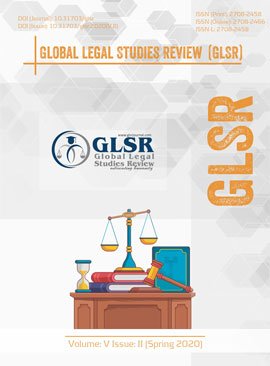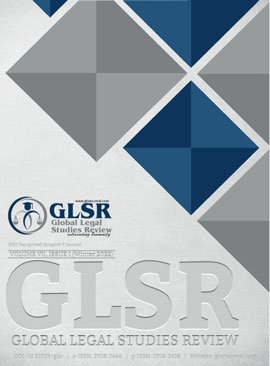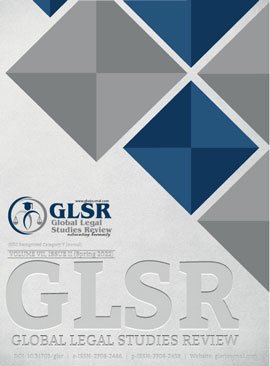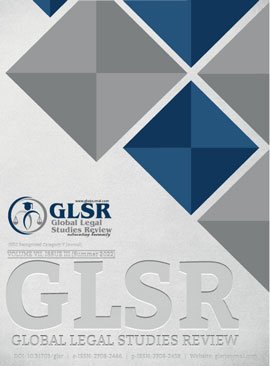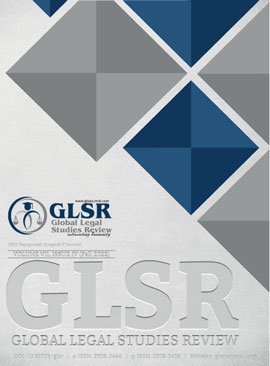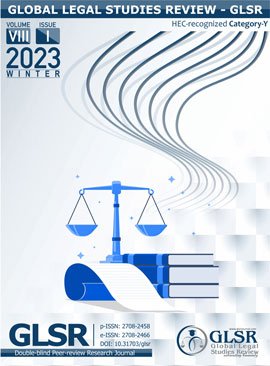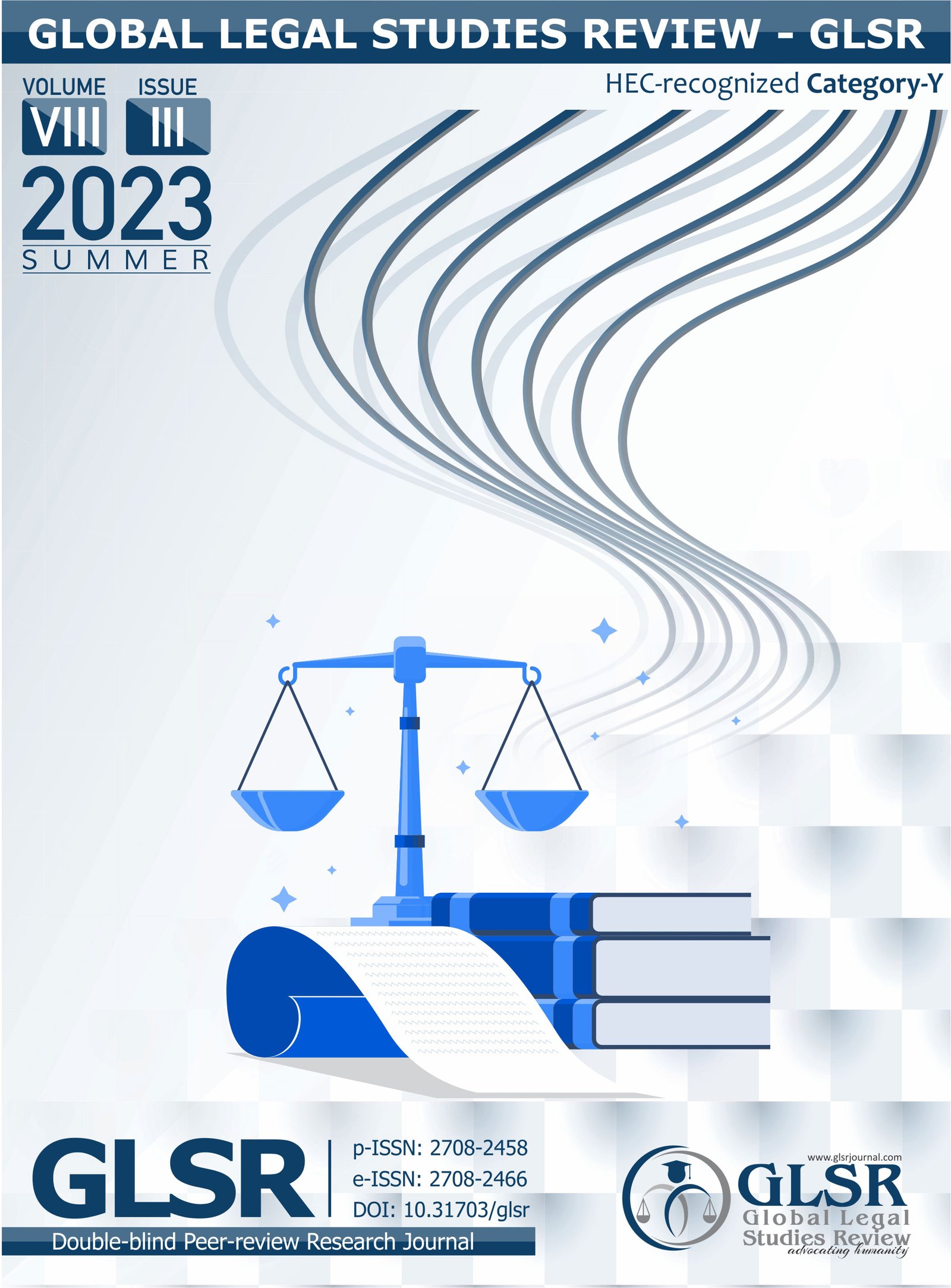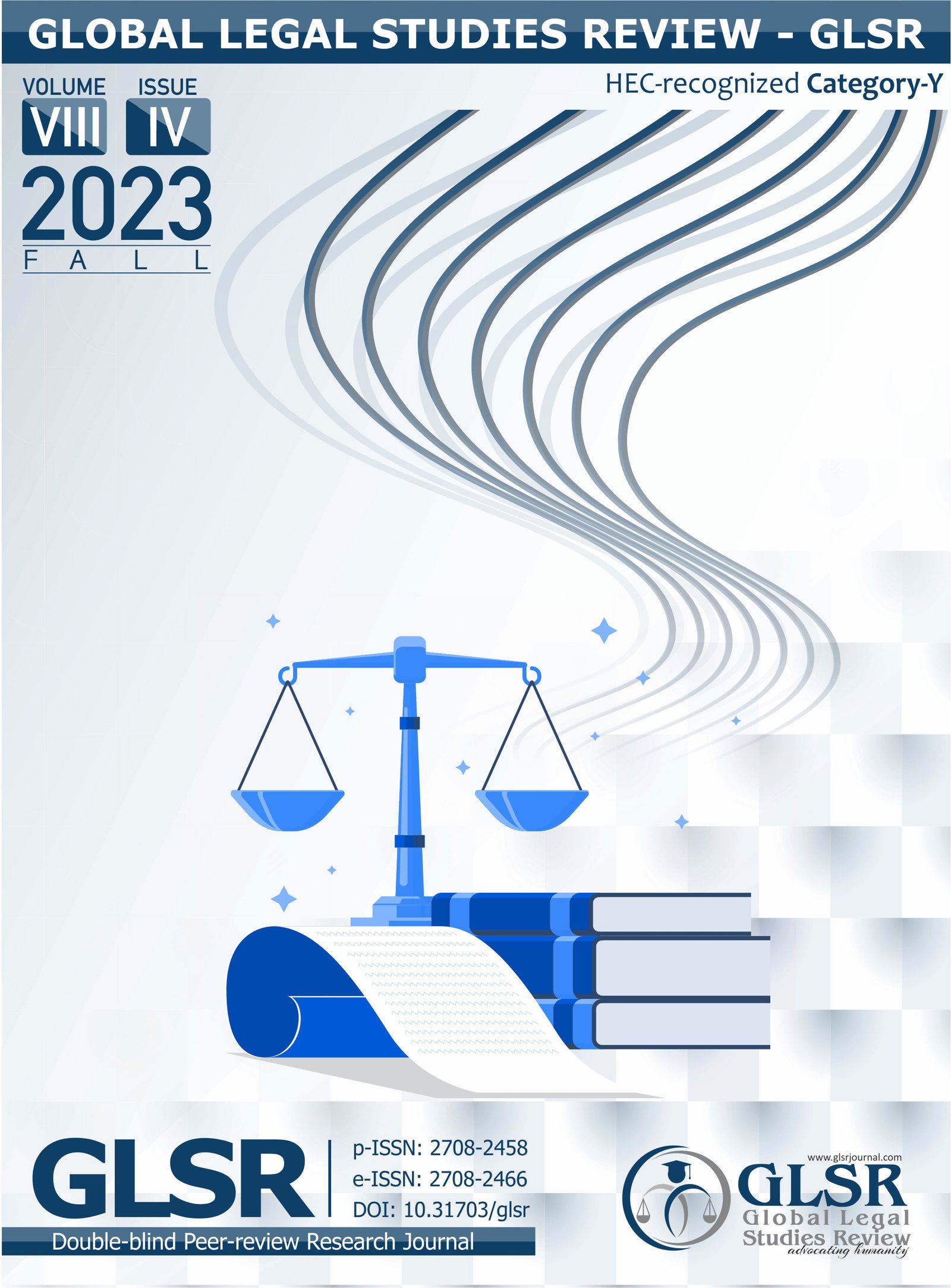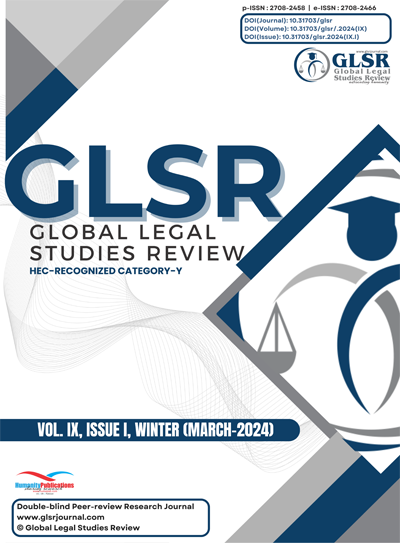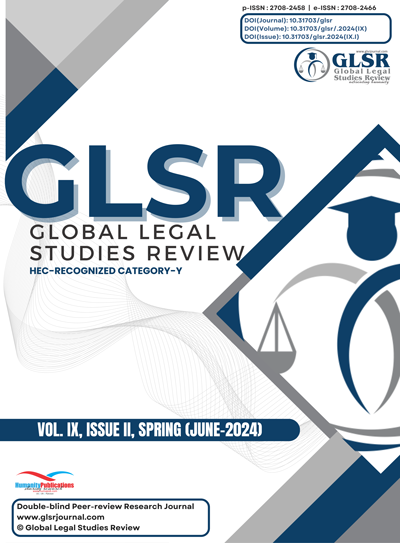
Global Legal Studies Review
-
Address
Office #1,2, First Floor, Fazal Arcade,
F-11 Markaz, Islamabad, Pakistan. -
Email address
managingeditor@glsrjournal.com
Monday to Friday 9am - 7pm -
Contact information
info@glsrjournal.com, +92 332 9147618
Monday to Sunday 24 Hours
- Publishing research Since2016
- Publication FrequencyQuarterly
- Access TypeOpen Access
Global Legal Studies Review (GLSR) is published by Humanity Publications, a leading publishing house in Pakistan in research and analytics, that assists researchers in advancing research outcomes for societal benefit. To wipe out societal ills and to add the humanity by boosting up measures among the individuals of the global society. GLSR intends to promote qualitative and quantitative researches and findings with the help of newly emerging tools and patterns utilized in experiments, observations, interviews, analysis and surveys by encircling all major segments of Legal studies and interdisciplinary academic and research disciplines. GLSR is a interdisciplinary, quarterly, Double-blind peer-reviewed research journal which encompasses major disciplines of Legal studies i.e. Criminal Law, Civil Law, Health Law, Family Law in general with specific interest in the sub-disciplines detailed at www.glsrjournal.com/about-us/scope/
The Core Aims and Objectives of the GLSR Journal include:
- To advance research in all sectors of Legal Studies
- To promote publishing of high quality theoretical and empirical research scripts
- To develop global networks among academicians, researchers and professionals for interaction and mutual cooperation
- To encourage different genres in creative and research writing
- To enhance the diversity, multiplicity and miscellany of the research on society in general
This study examines how judicial activism impacts governance in Pakistan after the lawyer's movement with a focus on its effect on human rights, the rule of law, and accountability. The study uses mixed techniques to examine Supreme Court decisions and interventions that demonstrate the judiciary's role in protecting civil liberties and checking executive powers. Ap... read more
PDF Full TextThe 2011-started Syrian conflict has become among the most extensive humanitarian disasters in current times. The current study investigates how International Humanitarian Law protects medical staff and population groups throughout the Syrian conflict which constitutes a non-international armed conflict (NIAC). Since the legal foundation known as Geneva Conventions ... read more
PDF Full TextIt has been argued in this article that endeavours to improve corporate governance should be diverted to change the perception of corporate law. Managerial unethical practices are dealt with corporate governance strategies; rather, they should be addressed by empowering shareholders to initiate proceedings against errant directors, who are primarily accountabl... read more
PDF Full TextThe paper explores why the Torture and Custodial Death(Prevention and Punishment) Act, 2022, in Pakistan has failed to significantly reduce custodial torture. Despite the fact that the failure of the Act is not a coincidence but an institutional problem, this study proposes that, through qualitative examination of the text of the law, institutional requirements, and... read more
PDF Full TextJournal Metrics
Journal Indexing
Scope
Global Legal Studies Review-GLSR covers interdisciplinary issues and problems of legal studies in its classical sense. Therefore, it encompasses most of the sub-disciplines of legal studies (but not limited to) i.e. Criminal Law, Civil Law, Health Law and Family Law etc. in general.
Global Legal Studies Review - GLSR entertains papers in the following domains (but not limited to) of Human Society
1. Laws
- Domestic laws
- National laws
- International laws
- Comparative laws
2. Criminal Law
- Threatening
- Harmful
- Endangering to the property,
- Health,
- Safety,
- Moral welfare
- Substantive criminal law
- Sentencing
- White-collar crime
- International criminal law
- Plea-bargaining
- Criminal procedure
3. Civil Law
- Torts
- Contract law
- Family law
- Personal disputes
4. Law & Economics
- Natural economic law
- Market regulation law
- The law of macro-economic control
- The law of micro-economic control
- Banking & Commercial Law
5. Law & Political Science
- Role and power of the Constitution and judiciary
- Human rights
- International law
- Rights and duties of citizens
- Rewards and punishments
6. Law & International Relations
- IGOs
- NGOs
- Diplomacy & Foreign Policy
- Security & War Laws
7. Health Law
- Healthcare regulations
- Healthcare fraud
- Medical malpractice
- Public health law
- Drug law
- Biotechnology law
8. Family Law
- Legal research and writing
- Child law
- Torts
- Adoption law
- Trusts Estates
- Juvenile justice
- Elder law
Subjects
While aiming to be inclusive for all fields (existing and emerging) of Social Sciences and Arts & Humanities with the perspectives of Legal Studies, GLSR visions to receive submissions for publication in the following subjects. The listed subjects highlight the diversity of matters relating to and affecting human society are duly encompassed by GLSR.
1. Human and Society
- Social Work
- Sociology
- Psychology
- Gender Studies
- Urban Studies
- Tourism & Hospitality
- Anthropology
- Business and Economics
- Criminology & Penology
- Human Rights
- Law
2. Education and Mass Studies
- Mass Communication
- Elementary, Secondary & Higher Education
- Curriculum
- TESOL
- Transformative Education
- Adult Education
- Health & Physical Education
3. Historical and Regional Studies
- History
- Heritage & Architecture
- Geography
- Pakistan Studies
- Area Studies
- Asian & African Studies
- American & European Studies
4. Government and Politics
- Political Science
- International Relations
- Defense & Strategic Studies
- Peace & Conflict Studies
- Public Policy
- Management & Public Administration
- HR & Leadership
- Developmental Studies
5. Human Society & Sciences
- Public Health
- Psychiatry
- Cyber & Artificial Intelligence
- Computational Social Sciences
- Statistical Knowledge
- Industrial Relations
- Information Sciences & Library Sciences
- Media Sciences
- Maritime Studies
- Bio-Societies &. Bioethics
- Technology & Development Studies
- Sports Sciences & Leisure Studies
- Mathematical Methods in Social Sciences
- Environmental & Climate Studies
6. Human & Arts
- Language & Linguistics
- Literature & Culture
- Fashion & Designing
- Archaeology
- Philosophy
- Religion
- Radio, Television & Film
Note: This List is not limited to the abovementioned details, researchers are called for, to send articles pertaining to Social Sciences (inter-disciplinary, trans-disciplinary, and multi-disciplinary perspectives) encircling all aspects of Legal Studies. We encouraged the newly emerging aspects of Legal Studies.
Editorial Board

Dr. Sohail Shehzad, Professor, Law College, University of Peshawar, Khyber Pakhtunkhea, Pakistan.
ssuhailshazad@hotmail.com

Dr. Muhammad Zubair Khan, Associate Professor, Department of Law, Abdul Wali Khan University Mardan, Mardan, Khyber Pakhtunkhwa, Pakistan.
mzubair@awkum.edu.pk

Dr Yasir Aleem, Assistant Professor, College of Law, University of Sargodha, Punjab, Pakistan.
yasir.aleem@hotmail.com

Tabinda Rani, Lecturer, Department of Law, Hazara University Mansehra, KP, Pakistan.
mylawdocuments79@gmail.com
Advisory Board

Dr. Deepali Rani Sahoo, Assistant Professor, Symbiosis International (Deemed University), Pune, Maharashtra, India.
sahoodeepali4u@gmail.com

Dr. Muhammad Muneer, Professor, Department of Law, International Islamic University, Islamabad, Pakistan.
muhammadmunir@iiu.edu.pk

Dr Ghulam Murtaza, Associate Professor, College of Law, Government College University, Faisalabad, Punjab, Pakistan.
ghulammurtiza@gcuf.edu.pk

Dr. Muhammad Akbar Khan, Assistant Professor, Faculty of Shariah & Law, International Islamic University, Islamabad, Pakistan.
m.akbar@iiu.edu.pk
Archives
Soon after its creation, Pakistan confronted many issues including refugee problem, scarcity of able political leadership, absence of mutual consensus between both wings of the country and confusing nature of the relationship between Islam and state etc. took almost nine years to frame the permanent constitution for Pakistan. Constitution, the basic document of a state, determines the shape of ... read more
PDF Full Text Views (8487)The judges' decision-making always plays a very significant role in governance and the judicial system. The fortification of judicial decision-making is generally considered different aspects that operate on different levels: external and internal factors. This study examines the various Psychological flaws, i.e. Implicit Biases, Heuristics (mental shortcuts), and Noise (varied judgments at dif... read more
PDF Full Text Views (7100)The paper explores the study of female prisoners who are facing multiple issues regarding health by taking into consideration the rights given to them under international law and how far those rights are available to them within local laws. The miserable conditions of prisoners around the world need no elaborations, particularly in less developed countries are taken into account; it speaks volu... read more
PDF Full Text Views (4248)The Constitution of Pakistan 1973 protects its citizens by guaranteeing some fundamental rights. It is, however, a matter of great concern that these rights do not cover the "right to access the necessities of life like access to clean water, food, clothing, shelter, and medicine etc". It, thus, leads imperfection of the constitutional rights. Therefore, this study aims to highlight this gap by... read more
PDF Full Text Views (4049)Sovereignty is one of the most appreciated attributes of a political system. However, there are certain issues to which political thinkers share competing views: the original presenters of the concept of sovereignty, how the concept of sovereignty evolved, how a sovereign represents the will of people, and what are the common and differentiating features of sovereignty between the western and t... read more
PDF Full Text Views (2728)Since the Arab Spring, Yemen became the center of worst humanitarian crisis in modern history. This paper investigates the fundamental causes of the current conflict in Yemen and also explicates the legal dimension of International humanitarian law. Political marginalization, social disenfranchisement, economic collapse, the failure of the Yemeni government to address and resolve the socioecono... read more
PDF Full Text Views (2704)Ever since India and Pakistan entered into a conflict that commenced with Pulwama attacks, the following incidents have grabbed the geopolitical situation of South Asia into odds. The region has indulged in a security dilemma so much with the possibility of a nuclear war break out between the two nuclear neighbors. The Kashmir issue is a conventional issue between India and Pakistan since indep... read more
PDF Full Text Views (2523)FATA, located in northwestern Pakistan, was once a battlefield for nineteenth-century imperial domination. Soon after Pakistan's independence, various tribes admitted allegiance to the state. There was a separate political and administrative system in FATA; this system retained the traditional way of 'JIRGA' system in these areas, which were included in the 1973 constitution of Pakistan. After ... read more
PDF Full Text Views (2439)The article is an in-depth study of the online trade and online dispute resolution and instances which keep Pakistan's judiciary's unwillingness in assimilating this entity into its judicial system. It will also highlight the use of electronic-mediation (e-mediation) and electronic-arbitration (e-arbitration) and their relationships with online trade. Additionally, this article examines the pre... read more
PDF Full Text Views (2328)The scientific knowledge and skills are the result of sophisticated methods where the liability of courts and investigation process has been increased during the last couple of decades. The use of technology and different other similar modern methods are helpful in the detection of offenders, and it is the revolutionary evaluation of investigation techniques. Since the offenders are also using ... read more
PDF Full Text Views (2276)The research paper investigates the role of the Parliamentary opposition in the constitutional amendments adopted during PPP's government (2018-2013). The role of the classic or loyal opposition is that it offers different alternatives against government policies. It not only opposes the government policies but also maintained political competition by forwarding its own policies. It does not ma... read more
PDF Full Text Downloads (1)Sovereignty is one of the most appreciated attributes of a political system. However, there are certain issues to which political thinkers share competing views: the original presenters of the concept of sovereignty, how the concept of sovereignty evolved, how a sovereign represents the will of people, and what are the common and differentiating features of sovereignty between the western and t... read more
PDF Full Text Downloads (1)The legal mechanism that has been adopted for insider trading in Pakistan focuses on the associated and connected person includes Securities and Exchange Ordinance 1969 and Companies Ordinance 1984. The paper discusses the key issues regarding the associated and connected person and legal regime regarding the effectiveness of insider trading in Pakistan. This paper examines the existing laws in... read more
PDF Full Text Downloads (0)The ideology of Bretton Woods for multilateral trading system buried in the USA during the reigns of Trump. He has not only reversed the 80 years' trade rules of the USA but poses a potential threat to Multilateral trade and endangered the WTO mechanism of dispute resolution by delaying the nominations forits Appellate forum. The present study focuses both on the potential crises in internation... read more
PDF Full Text Downloads (0)The labour laws of China, India, and Pakistan are compared in this article. It shows how imitative isomorphic propensities and basic concepts of justice like equality, equity, and necessity may have resulted in labour law parallels in all the three nations. Unique cultural, social, and historical variables, on the other hand, have resulted in considerable variations in these labour regulations.... read more
PDF Full Text Downloads (0)Education is condition sine qua non for the development of a country. Therefore, international human rights law emphasizes the right to education with its categorical implementation throughout the globe.The constitutional backing in Pakistan was a principle of policy (Article 37) initially which was later on supplemented by the eighteenth Amendment. The Amendment not only recognizes the right t... read more
PDF Full Text Downloads (0)The word Demurrage itself explains the cost imposed on the consignee or owner of goods for delays beyond the free days which is called lay time in legal terms but due to late clearance and many more related issues shipper and consignee both suffer. Although, the courts of Pakistan grant a stay to the consignee for non-payment of demurrage under section 14-A custom A... read more
PDF Full Text Downloads (0)Nowadays, electronic governance has got importance due to its significant role in both developed and developing states ushered as a modern tool of governance. The core aim of e-Governance is to supervise and ease governance for residents, government, and businesses. There are basically four types of e-government services provided: Government to Business (G2B), Government to Government (G2G),Gov... read more
PDF Full Text Downloads (0)The Islamic Republic of Pakistan like several other States of the world is a home to marvellous wildlife. There is a considerable variety of flora and fauna glorifying the landscape as well as forests of the country. This natural wealth of Pakistan is not being treated as it deserves for its continuous growth and preservation. Precious species of animals and birds are facing the risk of extinct... read more
PDF Full Text Downloads (0)This article discusses some murder trials in Pakistan during the year 2021 and underscores theevidence for the lack of pre-trial investigation and preparation of prosecution case as observed in such cases;and the impact of such lack of preparation of the case on the prosecution's interest in the justice system. Inorder to underpin the argument of this paper, 21 murder cases are chosen randomly ... read more
PDF Full Text Downloads (0)




